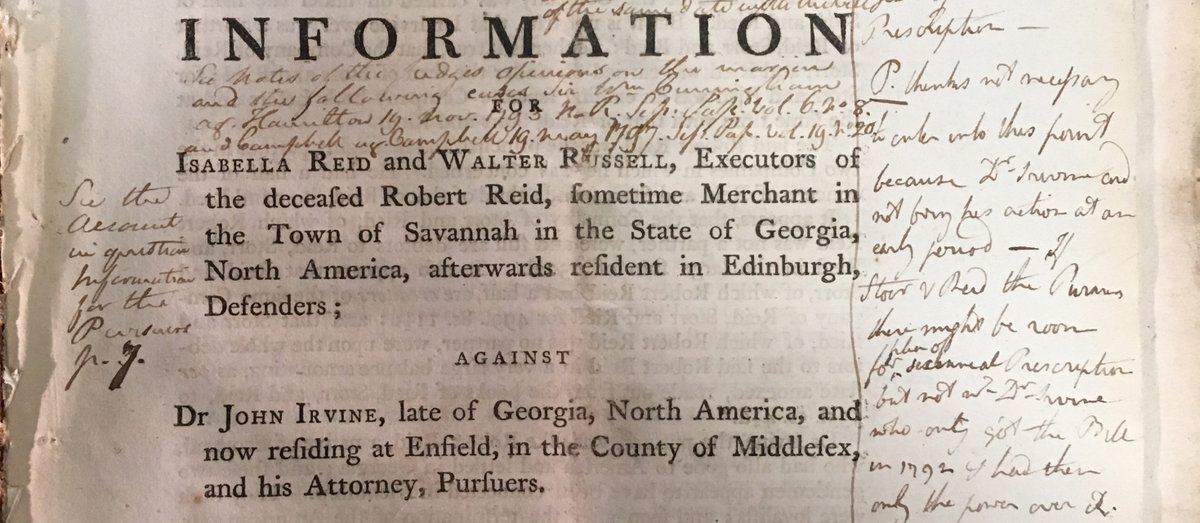Hey #digitalhumanities #digitalhistory #library #archives & #scholarly friends. The videos from our EDITOR Transcription Workshop: Cataloguing Where No One Has Catalogued Before are now live on @YouTube. This was a team effort between @CRC_EdUni, @UVALawLibrary, & me.
A thread:
A thread:
#EDITOR2021 was designed to showcase how digital technology can assist humanists in investigating, cataloguing, describing, and transcribing vast corpi in the archives that would normally take years (if not decades) to unpack.
2/
2/
The workshop centered on a home grown tool, called Editor (more below), & @Transkribus to tackle two very difficult and unique collections:
The printed #Scottish Court of Session Papers (18th & 19th c) & the manuscript diaries of 19th c #geologist Charles Lyell
#EDITOR2021
3/
The printed #Scottish Court of Session Papers (18th & 19th c) & the manuscript diaries of 19th c #geologist Charles Lyell
#EDITOR2021
3/
We kicked off Day 1: Session 1 with a welcome from @RachelHosker1 followed by @UVALaw Dean Risa Goluboff & @CRC_EdUni Deputy Head @ilikeoldbooks.
(Special appearance by @melissaterras)
Complete Session 1 video below: https://youtu.be/2lgsT7qDDZs
4/">https://youtu.be/2lgsT7qDD...
(Special appearance by @melissaterras)
Complete Session 1 video below: https://youtu.be/2lgsT7qDDZs
4/">https://youtu.be/2lgsT7qDD...
Norman Rodger, @RNFlaherty, & I then introduced our respective Scottish Session Papers projects (including @UVALAWSCOS), followed by @stitchintime14 & Elaine MacGillivray describing the @CRC_EdUni& #39;s magnificent
Charles Lyell Collection.
#EDITOR2021
5/
Charles Lyell Collection.
#EDITOR2021
5/
In Day 1: Session 2 introduced the Editor Tool, which uses machine learning & OCR to identify & recognize entities (persons, places, things) on a digitized page & understand an entity& #39;s context in relation to other things.
Session 2: https://youtu.be/5T8oXp2PObI
6/
https://youtu.be/5T8oXp2PO... href="https://twtext.com//hashtag/EDITOR2021"> #EDITOR2021
Session 2: https://youtu.be/5T8oXp2PObI
6/
In other words, we can teach Editor to recognize a name in a printed Session Paper as a name (not just a collection of characters) and figure out that person& #39;s role in the case by analyzing the name in relation and proximity to other key words on the page.
7/
#EDITOR2021
7/
#EDITOR2021
This also means we can use pattern recognition to identify the kind of formal titles we find in court documents that will allow us to build preliminary catalogues faster, thus making collections more discoverable faster.
8/
8/
This does not replace human expertise. Indeed, it deepens the need for it. We can use tools like #Editor to understand relationships, but they can& #39;t interpret them or give them meaning. Digital tools can help organize collections; Investigation requires heavy human lifting.
9/
9/
@CRC_EdUni& #39;s Mike Bennett ( @Digi_Dogsbody) is EDITOR& #39;s lead developer. He likes impossible challenges. Mike demoed the tool, followed by @evie_salter& #39;s reflections on her field testing of it on Session Papers & @stitchintime14 on using digital interns on this project.
10/
10/
Day 1: Session 3 kicked off with @RachelHosker1, @stitchintime14, & Nicholas Monroe describing how they are using @Transkribus to programmatically transcribe the @lyelltime diaries.
Session 3: https://youtu.be/-I_biuhUujI ">https://youtu.be/-I_biuhUu...
#EDITOR2021
11/
Session 3: https://youtu.be/-I_biuhUujI ">https://youtu.be/-I_biuhUu...
#EDITOR2021
11/
The final panel on of Session 3 featured the @CRC_EdUni& #39;s @Digi_Dogsbody, @ianthe88, & Norman Rodger describing how they can integrate the Editor Tool into their project workflows to advance/expedite cataloguing & research into materials like Session Papers.
#EDITOR2021
12/
#EDITOR2021
12/
The @UVALAWSCOS Team (me, @RNFlaherty, & @lorenmoulds) then discussed how we can leverage Editor in our Digital History projects (some of SCOS& #39;s recent updates were done using Editor) & imagine ways we can build digital history internships around the tool.
#EDITOR2021
13/
#EDITOR2021
13/
That& #39;s a wrap for Day 1 recap of #EDITOR2021. Stay tuned tomorrow for a thread about Day 2!
14/14
Fin
14/14
Fin

 Read on Twitter
Read on Twitter



